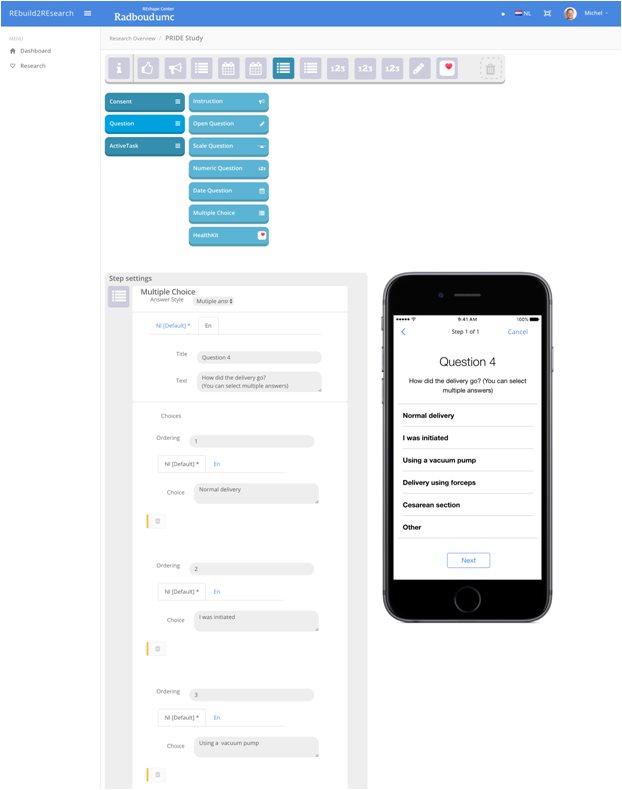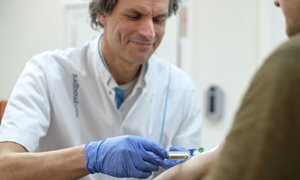11 April 2018
We are in the middle of the digital age. Billions of people use their smartphone to communicate and exchange information. Interestingly, an increasing number of people collect health data on their smartphone such as information about their mood, activity level, nutrition or vital signs including blood pressure or blood glucose levels. Medical research could greatly benefit from these 'real life' data, particularly since participation rates in observational studies have been declining for the last two decades. People may be too busy or do not feel the need to fill out questionnaires, self-measure, or complete lifestyle diaries. The challenge is, however, how to make these data available for scientific studies, in a simple way, but with the user in control.
Together with patients, doctors and members of a medical ethical committee, we explored this new concept in which 1) patients could actively participate in research such as by setting up their own study and 2) study participants could easily share their data with researchers. First, we emphasized that patients, since they collect and own data, they should also be in control. This resulted in the 'Personalized Consent Flow', that can be used by both study participants and researchers to decide what data will be shared, for what purposes, and for how long (Figure source: BioMed Research International)
Then, we selected Apple's iOS as the preferred platform since Apple's ResearchKit is highly secured and allows app developers not only to create questionnaires and extract health data, but also includes a variety of validated tests such as hearing and movement tests. The challenge was - as the director of REshape Lucien Engelen already recognized in 2016 - how to create a user friendly 'drag and drop' interface, that could be used by lay people and not by 'coding experts' only. Below, you see the result. Users can select 'modules' to eventually build a study, including an informed consent procedure, open and multiple choice questions, active tasks and health data sharing. After creating the study, a smartphone app is created and can be downloaded from the app store. This is further described in a video by my former colleague Thijs Sondag.

We have now evaluated REach, and published the results in - not surprisingly - the Journal of Participatory Medicine, a sister journal of the well respected Journal of Medical Internet Research. Dr. Marleen van Gelder, epidemiologist and one of the principle investigators explains:
"We invited young mothers participating in the PRIDE Study to test REach. They were asked questions about the delivery and their newborn such as weight and length. Subsequently, we compared answers from the app to a validated reference standard. I was impressed by the results: there were hardly any differences and correlation was nearly perfect. Furthermore, one third of participants shared their health data, which I consider as very promising, particularly as it is expected that an increasing number of people will start collecting health data. These data are impossible to collect with the traditional modes of data collection"
The full publication is available here. Next steps include two larger studies, that we will conduct in close collaboration with two Dutch Patient organizations. The focus of these studies is on how patients and patient organizations can determine relevant questions for scientific studies and also set up a new REach study. We expect to be able to share some preliminary results of the study this fall. If you have questions about REach or would like to discuss it further: feel free to connect!
https://www.linkedin.com/pulse/everyone-can-become-researcher-tom-h-van-de-belt-phd
 Blog by Tom van de Belt, researcher at REshape Innovation Center.
Blog by Tom van de Belt, researcher at REshape Innovation Center.
We are in the middle of the digital age. Billions of people use their smartphone to communicate and exchange information. Interestingly, an increasing number of people collect health data on their smartphone such as information about their mood, activity level, nutrition or vital signs including blood pressure or blood glucose levels. Medical research could greatly benefit from these 'real life' data, particularly since participation rates in observational studies have been declining for the last two decades. People may be too busy or do not feel the need to fill out questionnaires, self-measure, or complete lifestyle diaries. The challenge is, however, how to make these data available for scientific studies, in a simple way, but with the user in control.
Together with patients, doctors and members of a medical ethical committee, we explored this new concept in which 1) patients could actively participate in research such as by setting up their own study and 2) study participants could easily share their data with researchers. First, we emphasized that patients, since they collect and own data, they should also be in control. This resulted in the 'Personalized Consent Flow', that can be used by both study participants and researchers to decide what data will be shared, for what purposes, and for how long (Figure source: BioMed Research International)
Then, we selected Apple's iOS as the preferred platform since Apple's ResearchKit is highly secured and allows app developers not only to create questionnaires and extract health data, but also includes a variety of validated tests such as hearing and movement tests. The challenge was - as the director of REshape Lucien Engelen already recognized in 2016 - how to create a user friendly 'drag and drop' interface, that could be used by lay people and not by 'coding experts' only. Below, you see the result. Users can select 'modules' to eventually build a study, including an informed consent procedure, open and multiple choice questions, active tasks and health data sharing. After creating the study, a smartphone app is created and can be downloaded from the app store. This is further described in a video by my former colleague Thijs Sondag.
We have now evaluated REach, and published the results in - not surprisingly - the Journal of Participatory Medicine, a sister journal of the well respected Journal of Medical Internet Research. Dr. Marleen van Gelder, epidemiologist and one of the principle investigators explains:
"We invited young mothers participating in the PRIDE Study to test REach. They were asked questions about the delivery and their newborn such as weight and length. Subsequently, we compared answers from the app to a validated reference standard. I was impressed by the results: there were hardly any differences and correlation was nearly perfect. Furthermore, one third of participants shared their health data, which I consider as very promising, particularly as it is expected that an increasing number of people will start collecting health data. These data are impossible to collect with the traditional modes of data collection"
The full publication is available here. Next steps include two larger studies, that we will conduct in close collaboration with two Dutch Patient organizations. The focus of these studies is on how patients and patient organizations can determine relevant questions for scientific studies and also set up a new REach study. We expect to be able to share some preliminary results of the study this fall. If you have questions about REach or would like to discuss it further: feel free to connect!
https://www.linkedin.com/pulse/everyone-can-become-researcher-tom-h-van-de-belt-phd
Related news items

A great technology creating new dilemmas
20 December 2022Healthcare professionals are increasingly uncovering ‘unsolicited findings’ when performing a genetic test, which are disease-causing genetic variants unrelated to the initial question for which the genetic test was performed. This increase has led to a worldwide debate.
go to page




